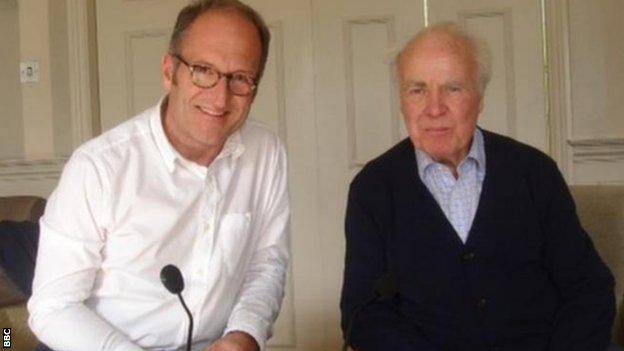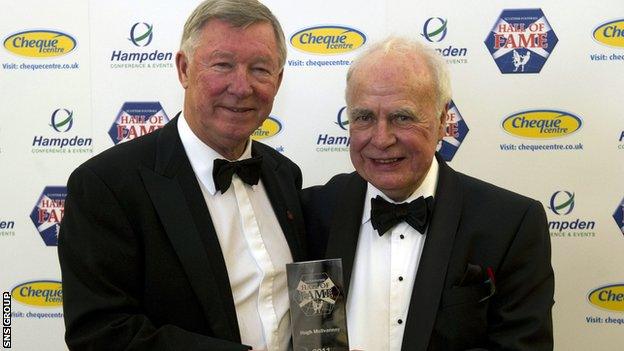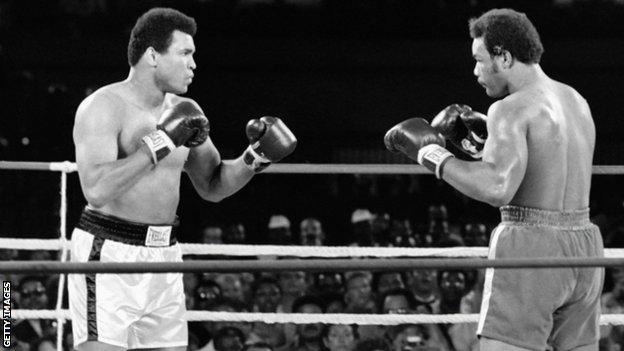Hugh McIlvanney: Remembering a remarkable life in sport
- Published

Hugh McIlvanney (right) recorded a six-part series for Radio Scotland in the summer of 2015
Why don't we sit down with Hugh McIlvanney and talk about his seven decades in sports journalism, reflecting on the major events he's attended and the great sports men and women he's interviewed?
And what about getting him to read passages of his own writings in that deep, distinctive accent that hadn't been diminished despite having lived in London for so many years?
The idea was born in the autumn of 2013 and the appeal lay in its simplicity.
When approached, McIlvanney was enthusiastic but health problems meant we had to put things on hold until June 2015.
The plan was to record two programmes, both around 30 minutes in duration. What we ended up with was six episodes of the 'McIlvanney Conversations', each lasting roughly 45 minutes.
We turned a hotel bedroom suite in Richmond into a recording studio and started on a Monday morning. There were regular breaks - Hugh liked to stretch his legs and puff on a large Cuban cigar - and we talked through to late afternoon on the Tuesday.
Hour after hour after hour of sporting history, nostalgia and personal memories.
For McIlvanney, one of four children, growing up in Kilmarnock in the 1930s, the route into journalism started on the local paper before spells on The Scotsman and The Daily Express led to The Observer and eventually The Sunday Times.
He went on to forge close working and personal relationships with, perhaps, the four finest football managers to emerge from Scotland - Jock Stein, Sir Matt Busby, Bill Shankly and Sir Alex Ferguson.
Indeed, when Sir Alex was penning his autobiography, 'Managing My Life' and needed someone to help him, there was only one person he considered.

Sir Alex Ferguson (left) welcomes Hugh McIlvanney to the Scottish Football Hall of Fame in 2011
Of all the footballers he watched, he rated four above all others - Pele, Maradona, Di Stefano and Messi - although he admitted there were strong cases also for George Best and Johan Cruyff.
And he believed Graeme Souness to be the best Scottish midfielder he'd seen, although he placed Jim Baxter, Billy Bremner, Dave Mackay and Bobby Murdoch not far behind.
Often described as Britain's greatest-ever sports writer, he was inducted to the International Boxing Hall of Fame and the Scottish Football Hall of Fame among his long list of awards and honours.
What struck me was how demanding he found the process of writing. Each week when he sat down to start his newspaper column, he did so on the basis of "don't screw it up." Only after he saw the print edition was he able to take any joy or satisfaction from it.
He also had to write about tragic events, including the death of his friend Stein, after the World Cup qualifying game in Cardiff in 1985. He was in Munich in 1972 to report on the Olympic Games when 11 Israeli athletes were murdered by a terror group.
He was ringside in Los Angeles in 1980 when the Welsh boxer Johnny Owen was knocked out by Lupe Pintor in a world title fight. Owen never regained consciousness and died seven weeks later. McIlvanney admitted that, in later life, he found the case for boxing harder to justify.

McIlvanney spoke at length with Muhammad Ali (left) after the famous 'Rumble in the Jungle'
His biggest scoop, however, was finding himself being invited into Muhammad Ali's villa just hours after he'd regained the world heavyweight title from George Foreman in that epic 1974 showdown in Zaire, remembered fondly as the 'Rumble In The Jungle'.
For two-and-a-half hours, McIlvanney filled his notebook as 'The Greatest' - unable to sleep after stopping Foreman just before the end of the eighth round - explained how he produced one of the great upsets in boxing history.
"It was by far the greatest privilege I've ever had as a reporter," said McIlvanney.
The privilege, for all of us, was to have had Hugh McIlvanney in our midst for so long.